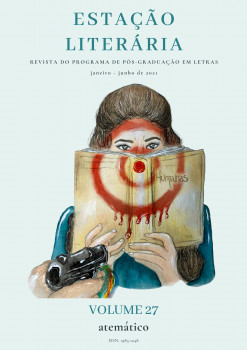The richardsonian parody in marquis de sade’s justine: on the use of intertextuality in late enlightenment
DOI:
https://doi.org/10.5433/el.2021v27.e43002Keywords:
Marquis de Sade, Samuel Richardson, Enlightenment, Comparative LiteratureAbstract
The paper deals with the employment of parody in Donatien Alphonse François de Sade’s Justine, ou Les malheurs de la vertu as a mean to criticize both the Christian worldview and Samuel Richardson sentimental novels. We depart from a brief approach to the formal innovation brought about by Richardson’s Pamela, or Virtue rewarded to the culture of the novel, analyzing how Sade frustrates the expectations of his historical readers. Finally, we bring to the fore some remarks by Georges Bataille and Pierre Klossowski on the singularity of Marquis de Sade’s thinking within the philosophical milieu of the Late Enlightenment, pondering how this disruptor of genres and doctrine can be deemed as a substantial character in the tradition of the modern novel.
Downloads
References
BATAILLE, Georges. A parte maldita, precedida de “A noção de dispêndio”. Belo Horizonte: Editora Autêntica, 2013.
BATAILLE, Georges. The use value of D. F. A. Sade (an open letter to my current comrades). In: ALLISON, David B.; ROBERTS, Mark S.; WEISS, Allen S. (eds.) Sade and the narrative of transgression. Cambridge: Cambridge University Press, 1995.
BECKER, Eva. Der Deutsche Roman um 1780. Stuttgart: J .B. Metzler, 1964.
DIDEROT, Denis. Obras II: Estética Poética e contos. Tradução: J. Guinsburg. São Paulo: Perspectiva, 2000.
DOODY, Margaret A. Introduction. In: RICHARDSON, Samuel. Pamela, or Virtue rewarded. London: Penguim Books, 1980. p. 7-20.
HAUSER, Arnold. História social da Arte e da literatura. São Paulo: Ed. Abril, 2000.
KLOSSOWSKI, Pierre. Sade, meu próximo. São Paulo: Brasiliense, 1985.
KOSELLECK, Reinhart. Crítica e Crise. Rio de Janeiro: Contraponto: PUC-Rio, 1999.
MORAES, Eliane Robert. O efeito obsceno. Cadernos pagu, vol. 20, 2003. p.121-130.
MORAES, Eliane Robert. O corpo impossível: a decomposição da figura humana: de Lautréamont a Bataille. São Paulo: Iluminuras, 2002.
MUECKE, Douglas Colin. Ironia e o irônico. São Paulo: Perspectiva, 1995.
RICHARDSON, Samuel. Pamela, or Virtue rewarded. London: Penguim Books, 1980.
SÁ, Daniel Serravalle de. O Marquês de Sade e o romance filosófico do século XVIII. Revista Eutomia, No. 2, p. 362-377, 2008.
SADE, Marquês. Discursos ímpios. Tradução: Plínio Augusto Coelho. São Paulo: Hedra, 2007.
SADE, Marquês. Justine, ou Les malheurs de la vertu. In: SADE, Marquês. Œuvres II. Édition établie par Michel Delon. Paris: Gallimard, 1995. p. 131-390.
SAUDER, Gerhard. Empfindsamkeit. In: DAHNKE, Hans-Dietrich; Otto, Regine. Goethe Handbuch, Band 4/1. Stuttgart & Weimar: J.B. Metzler, 2004. p. 248-252.
VASCONCELOS, Sandra Guardini. A Formação do Romance Inglês. São Paulo: Aderaldo & Rothschild: Fapesp, 2007. (Linguagem e Cultura, 39).
WATT, Ian. A Ascensão do Romance: Estudos sobre Defoe, Richardson e Fielding. Trad. Hildegard Feist. São Paulo: Companhia das Letras, 2010.
WEIMANN, Robert. Literaturgeschichte und Mythologie: methodologische und historische Studien. Frankfurt am Main: Suhrkamp Verlag, 1977.
Downloads
Published
How to Cite
Issue
Section
License
A revista se reserva os direitos autorais sobre as contribuições publicadas, sem retribuição material para o autor, podendo disponibilizá-las on-line no modo Open Access, mediante sistema próprio ou de outros bancos de dados; também poderá efetuar, nos originais, alterações de ordem normativa, ortográfica e gramatical, com o intuito de manter o padrão culto da língua, contando com a anuência final dos autores. As opiniões emitidas pelos autores são de sua exclusiva responsabilidade.












